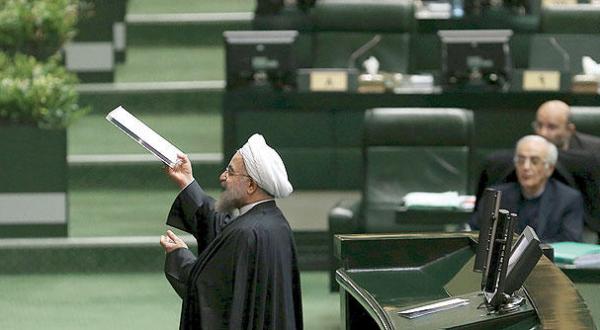Iranian President Hassan Rouhani harshly criticized an influential party without directly mentioning its name. The criticism stemmed from its deep involvement in both corruption and trafficking in Iran.
Rouhani stated that a corrupt organization in his country is responsible for smuggling goods inside, and obstructing the growth of Iran. “We have to stand up to this corruption”, he said.
The Iranian President panned the authoritative bodies that are monitoring the corruption, however, are not doing anything about it. Rouhani’s underlying tone referred to the overlooking judicial authorities. He stated that supervising federations are a necessity, yet not to work above the law and slow down the country’s progress.
Rouhani also expressed his government’s intentions on fighting corruption and bribery. In a sign made on the privatization of public sectors, Rouhani said that his administration will fight economic centralization and negative competition.
All the declarations were made on the sidelines of the event launching 138 constructional projects in commemoration of the 37th year of the Iranian Revolution’s triumph. Rouhani’s words came days after the Minister of Justice Mostafa Pourmohammadi’s proposal on establishing a counter-corruption organization in Iran. The proposal suggested merging several governmental bodies that work on fighting perversion.
Pourmohammadi said that a counter-corruption organization will help the Ministry of Justice and the Judiciary authorities to confront any degeneracy, confirming the importance establishing an organization in view of the piling up case files on corruption, and their touching on governmental and financial institutions in Iran.
Intensified Supervision on the Ministry of Economic Affairs and Finance’s divisions the like public treasury, tax organizations, customhouses, insurance companies, banks, and nongovernmental monetary institutions, was requested by Minister Pourmohammadi.
Pourmohammadi had pointed out the Rouhani administration spending efforts for founding a strong governmental organization capable of countering corruption in Iran. However, he also stated that the establishing of such a body would face parliamentary opposition.
Rouhani’s indictments concerning powerful organizations on economic activities in Iran, are not a first. He had previously accused the Army of the Guardians implicitly on their role in the Iranian economy, in 2014.
Information, artillery, capitalism, newsgroups, newspapers, and news agencies all fall in one place, and that is a reason for corruption, Rouhani had explained.
On Feb. 5, Ahmad Tavakkoli, head of the economic committee in the Iranian Parliament, revealed on the sidelines of the “National Convention for Transparency”, that corruption is estimated to have inflicted a 34 billion dollar worth of damage on the Iranian economy.
Perversion has spread dangerously into Iran’s governmental institutions, and even governmental bodies that fight corruption now suffer from it, Tavakkoli said.
Moreover, Tavakkoli hinted to judicial authorities and police that the spreading dissolution in the government is perhaps a result of corruption in their system. He detailed that the Iranian parliament is on its way to enact laws for dealing with institutional debasement.
Facets of exploitation are surfacing even more with the nearing of the mid-February electoral campaigns, featuring gangs, conspiracy, economic coverage, and family interests. It is said that the Iranian Supreme leader had criticized in 2011 media coverage on economic corruption and comprehensive embezzlement. The Supreme Leader considered that attempting such suits is for the purpose of damaging the Iranian officials’ image.
A statistical survey organization exposed the rates on corruption in Iranian institution, setting banks at 77 percent, municipalities and courts at 63 percent, and police departments at 55 percent. The study shows that 71 percent of Iranians believe the severity of misconduct infiltrating governmental bodies, whilst 96 percent believe that a “good punishment” is the perfect way to deter corruption in their country.

